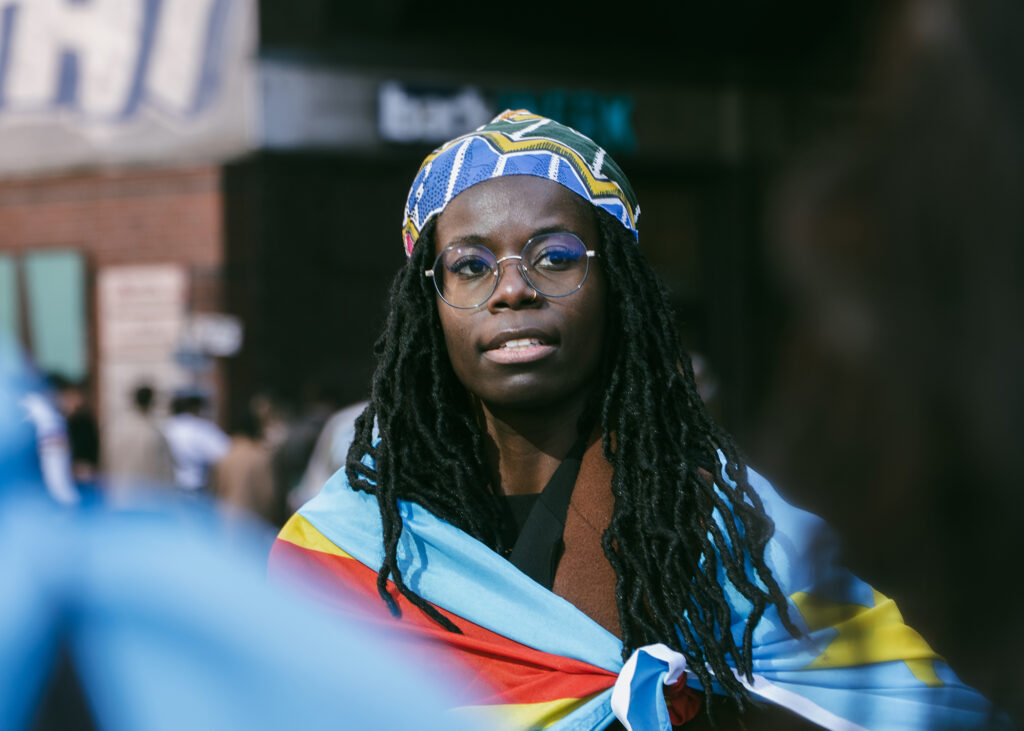
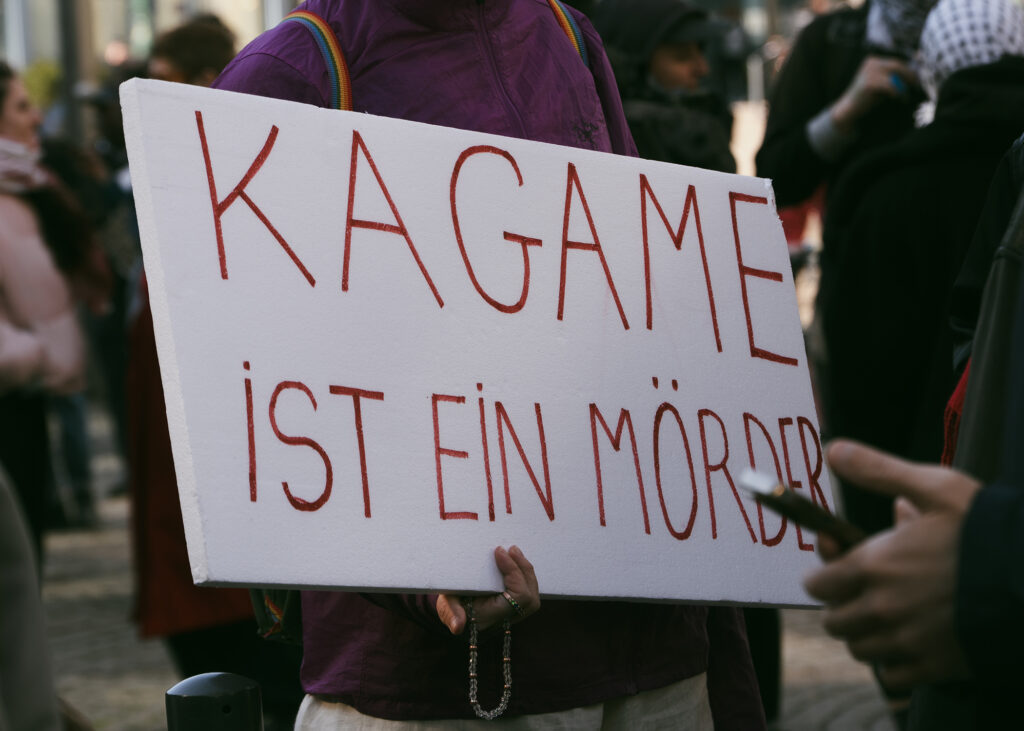
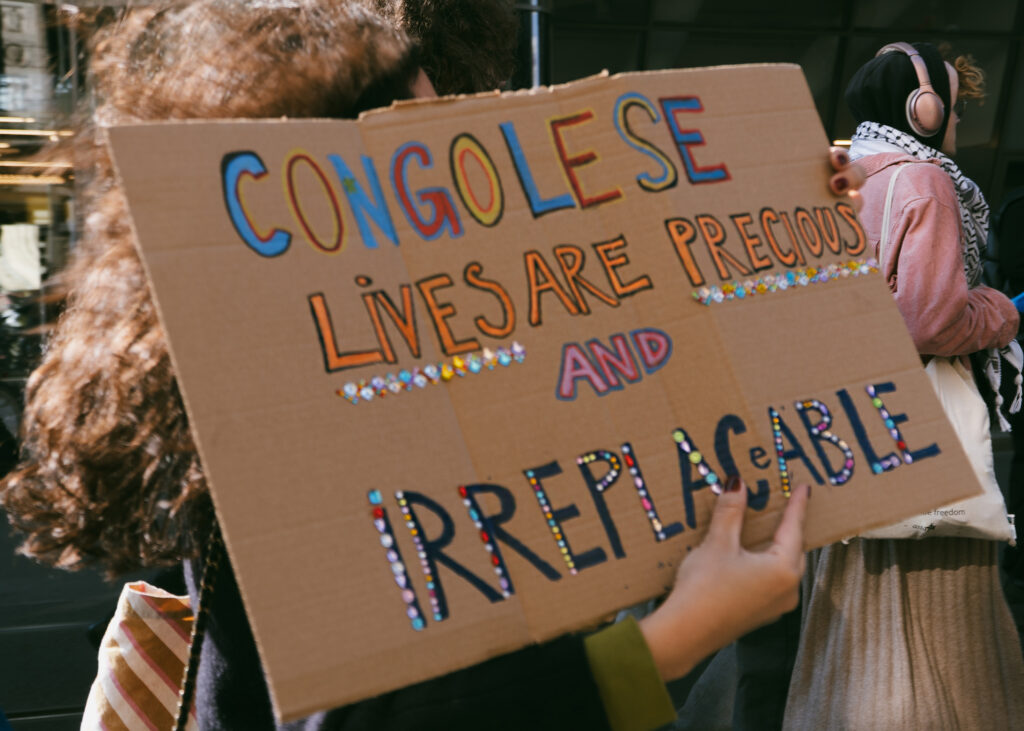
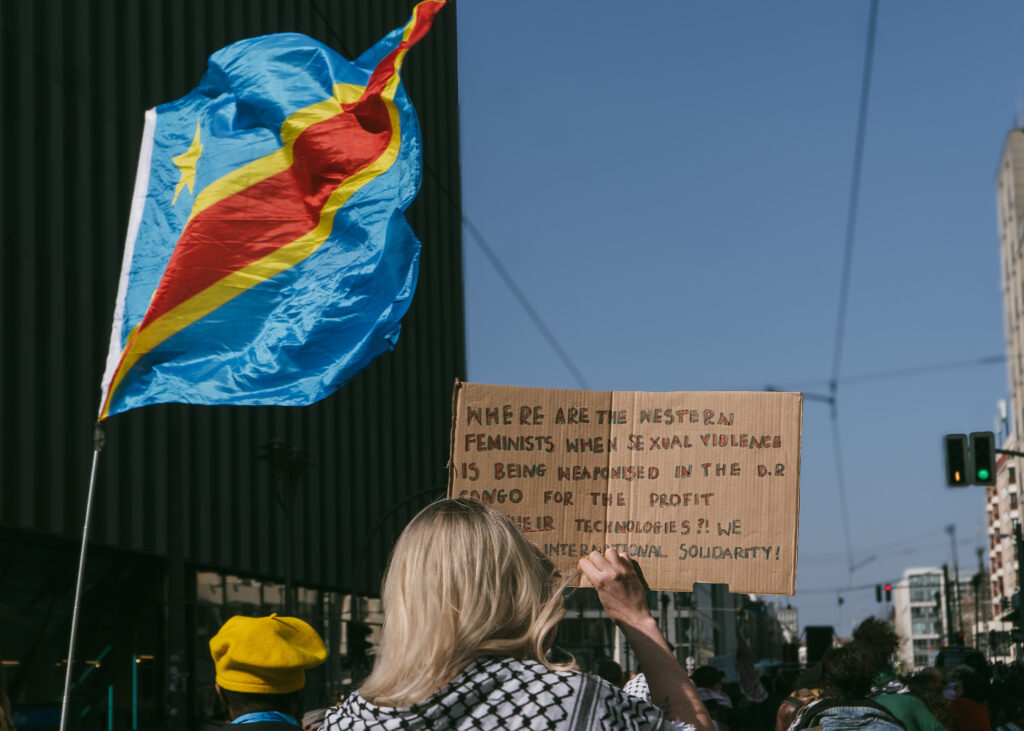
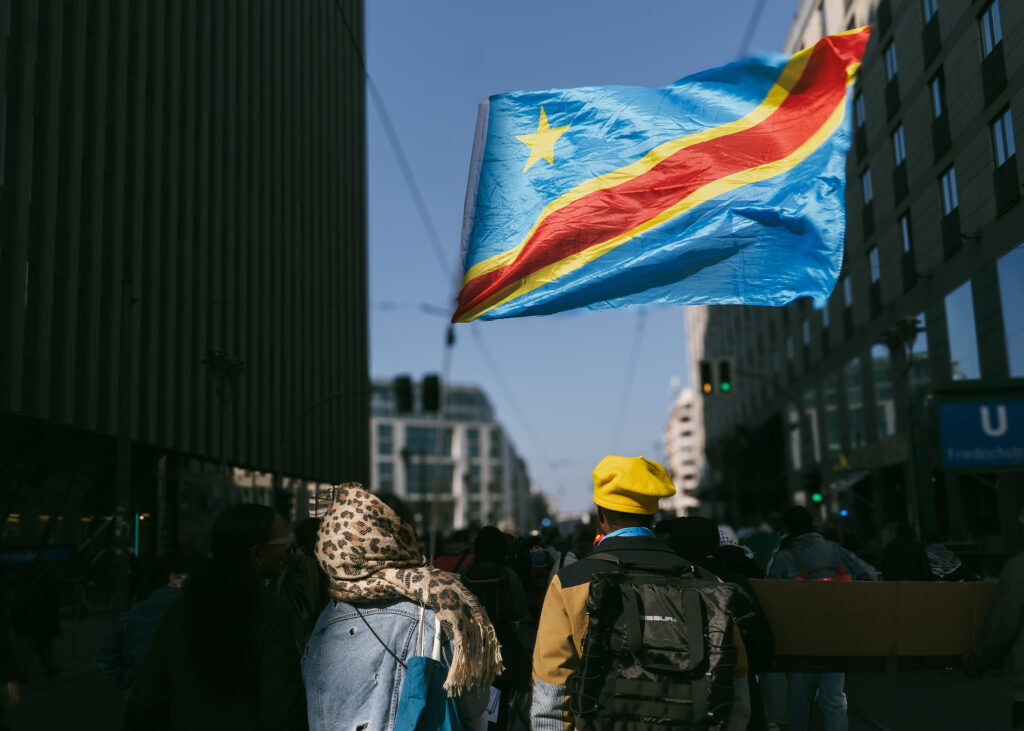
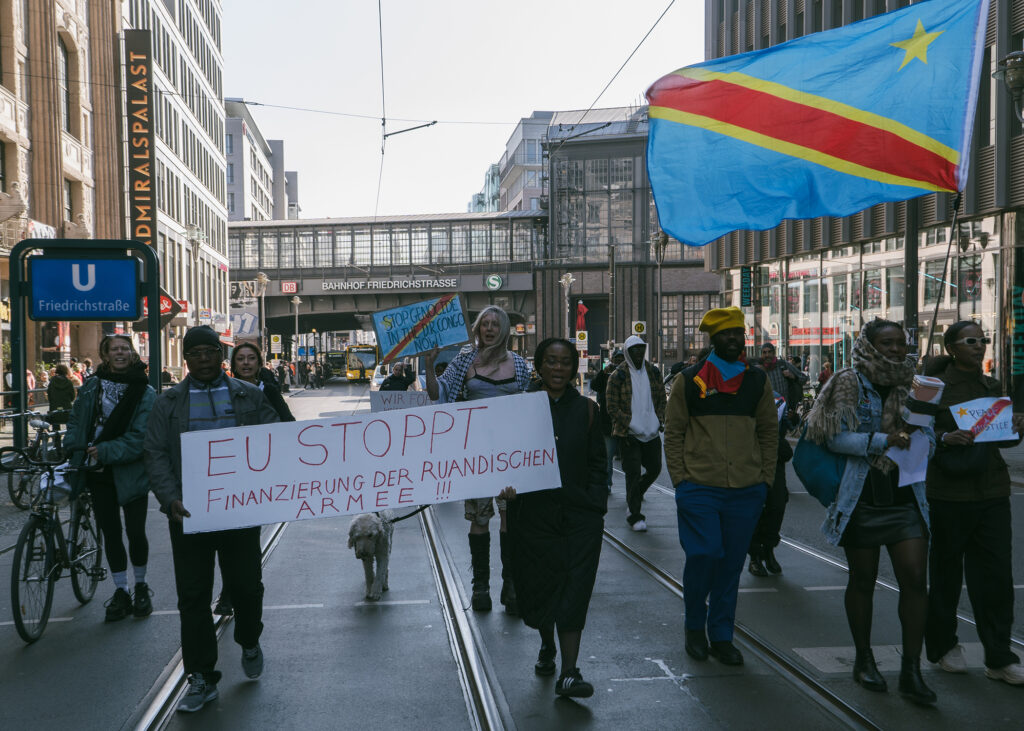
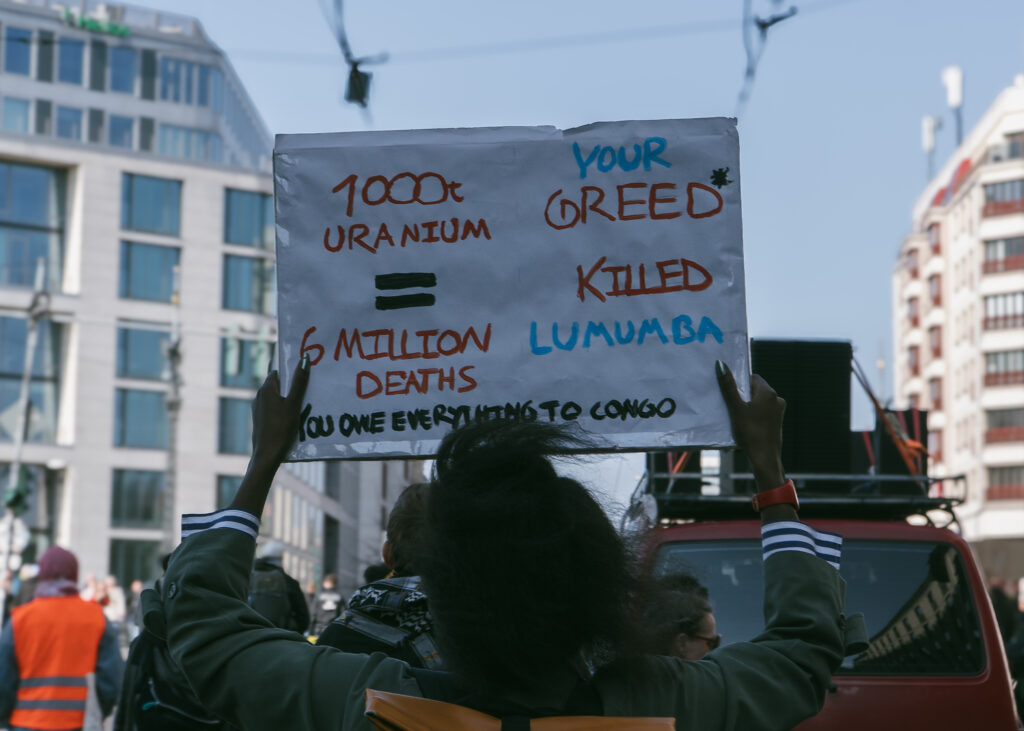
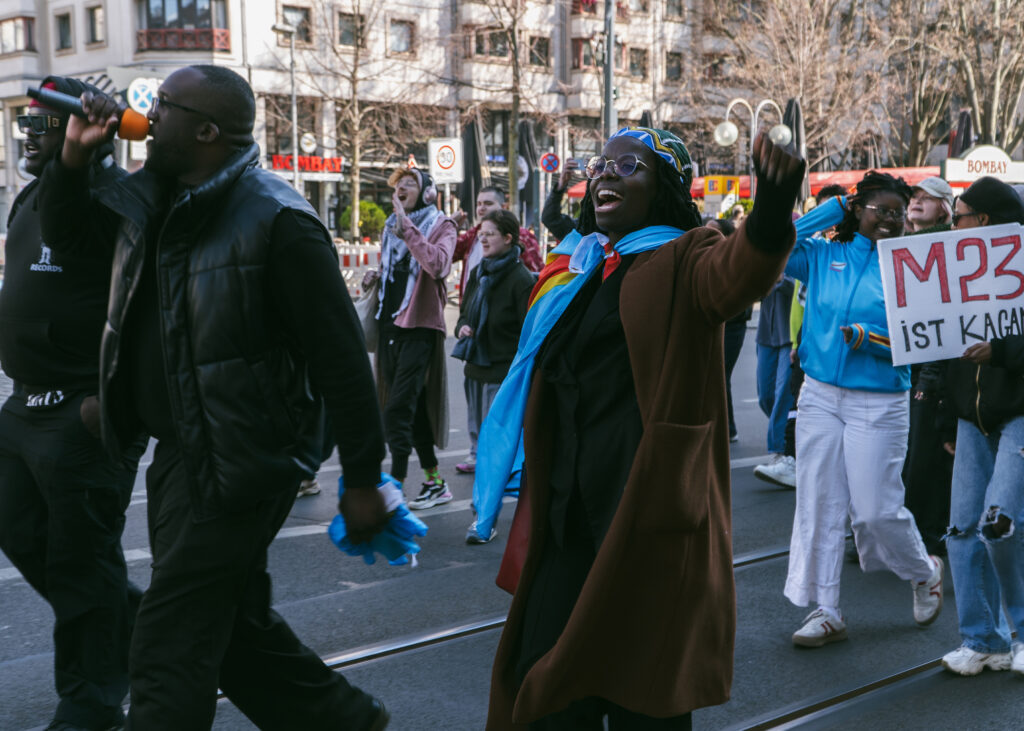
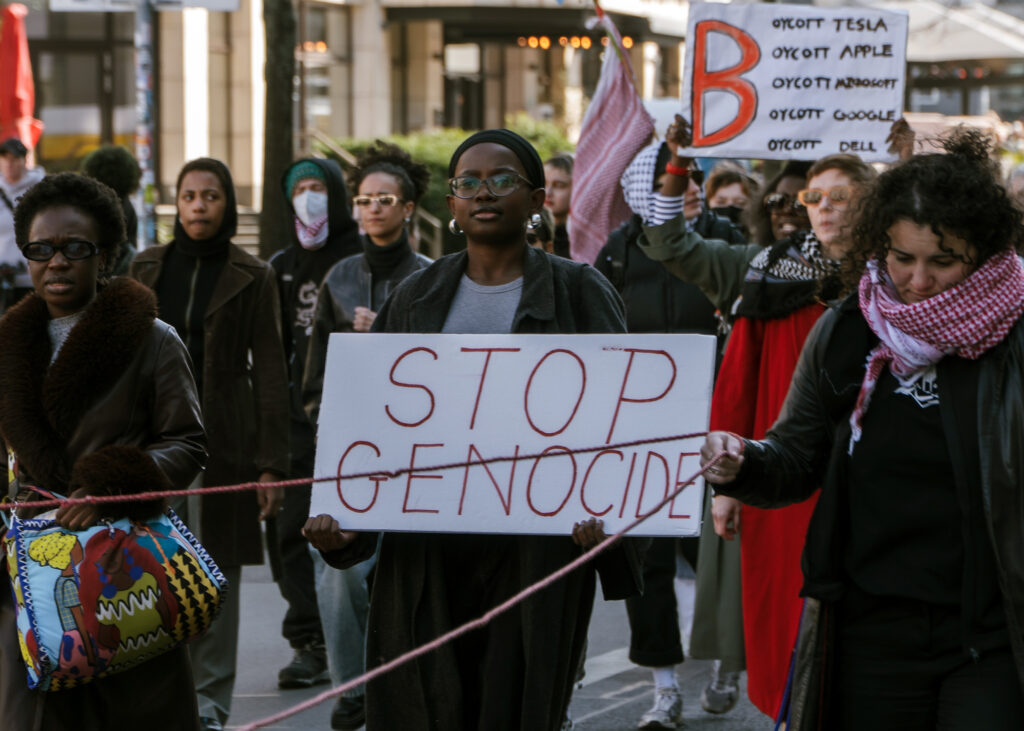
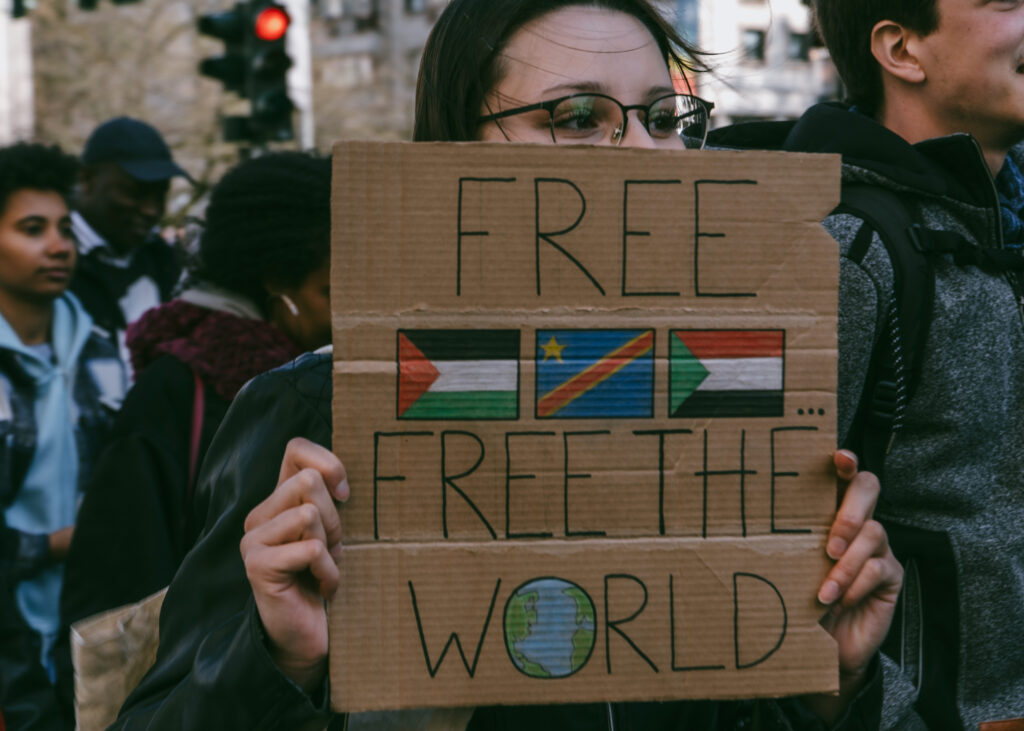
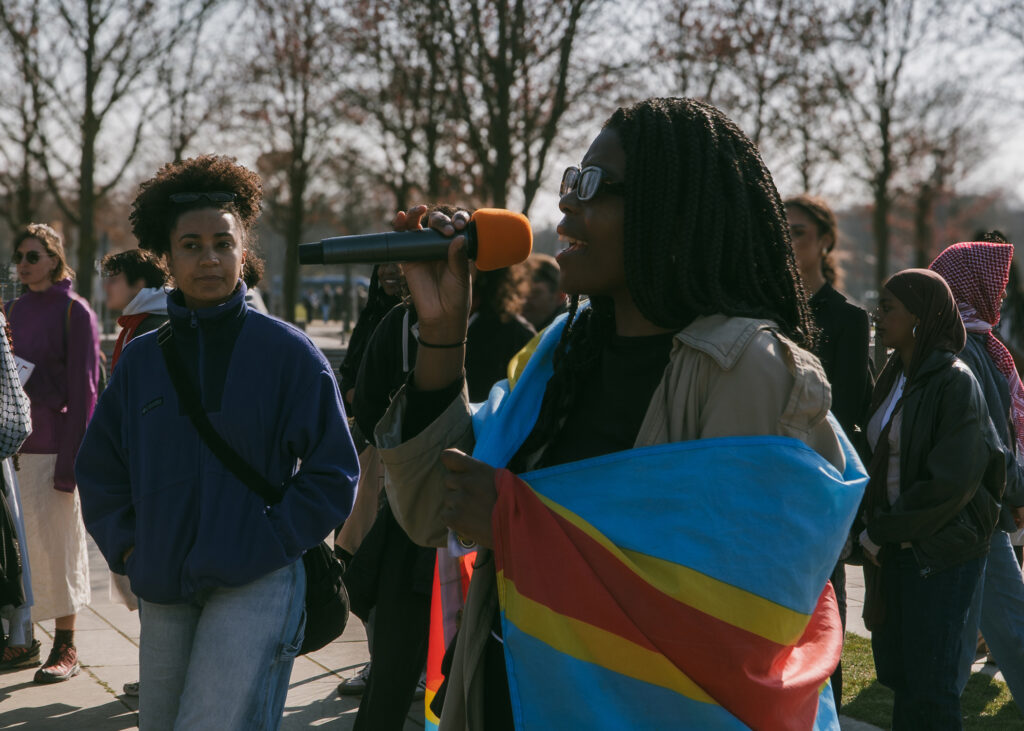
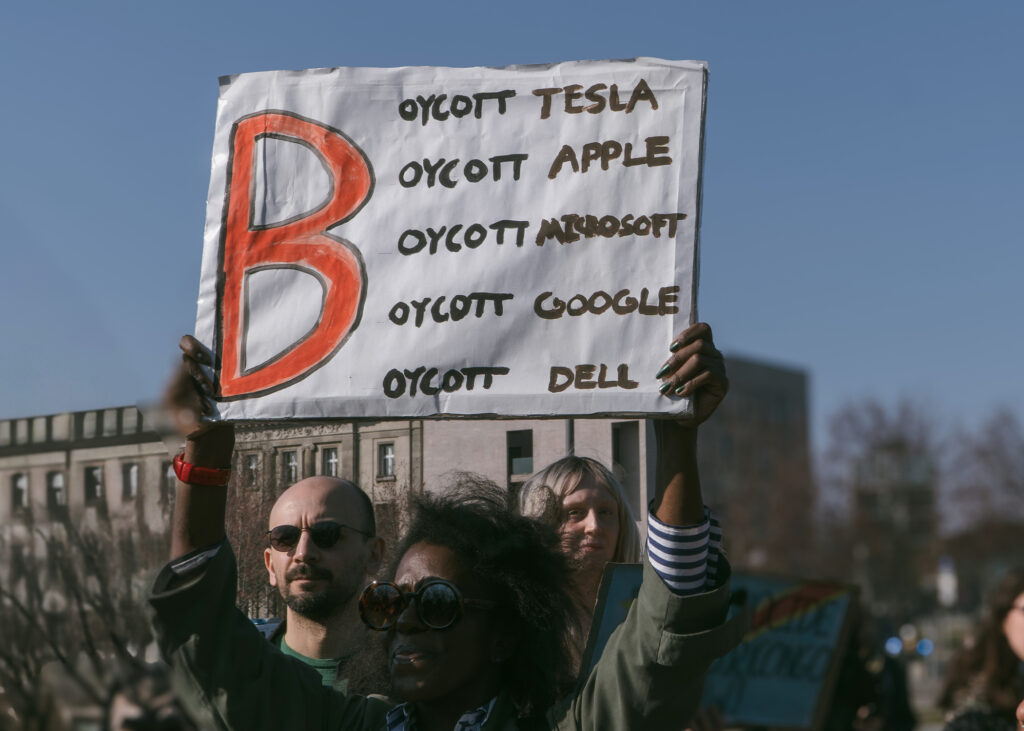
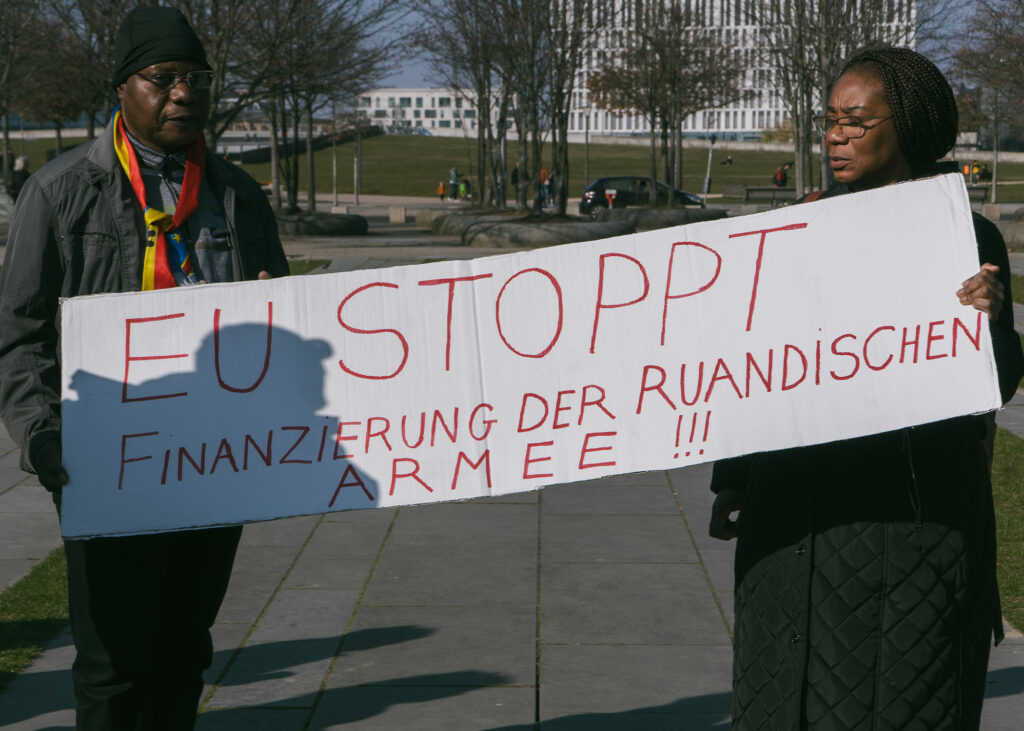
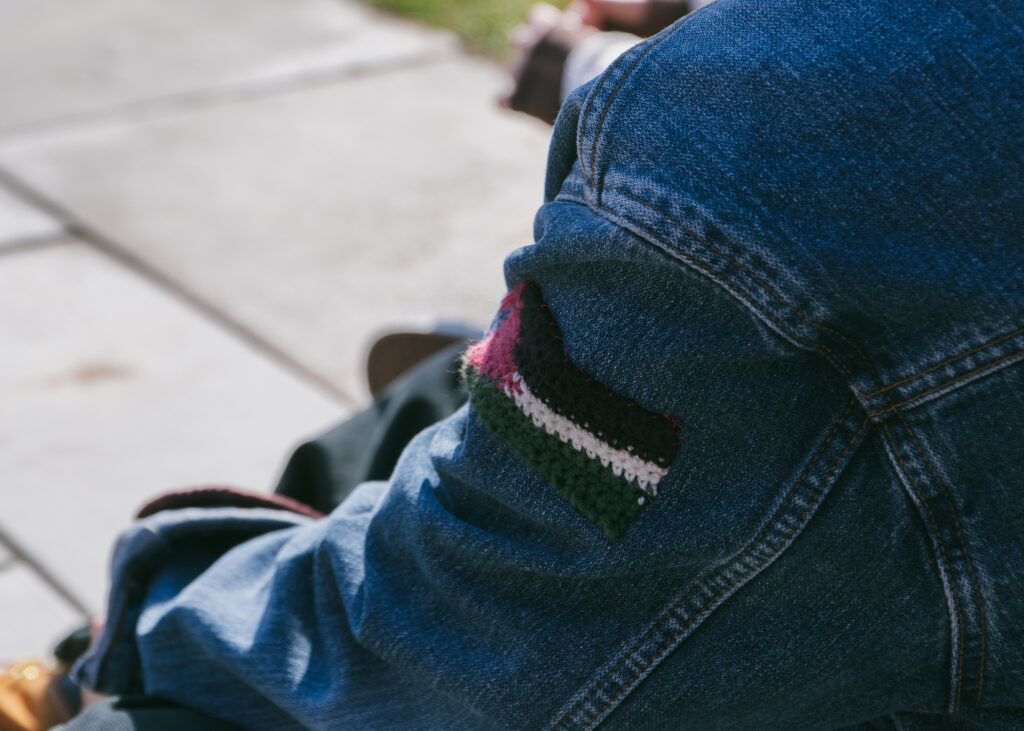
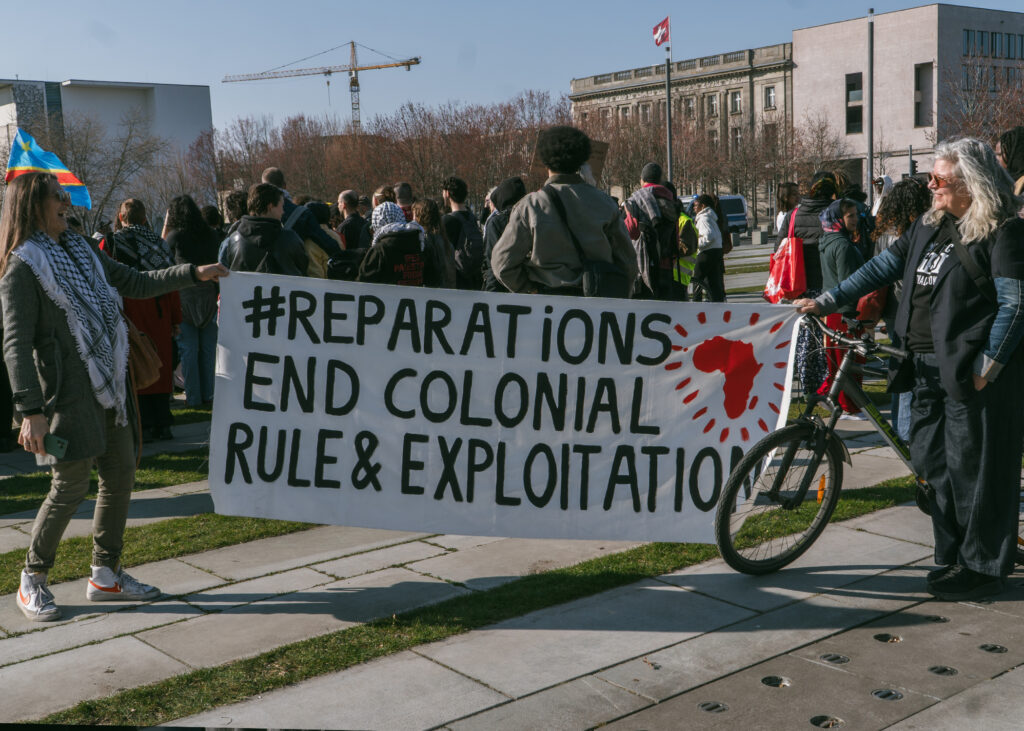
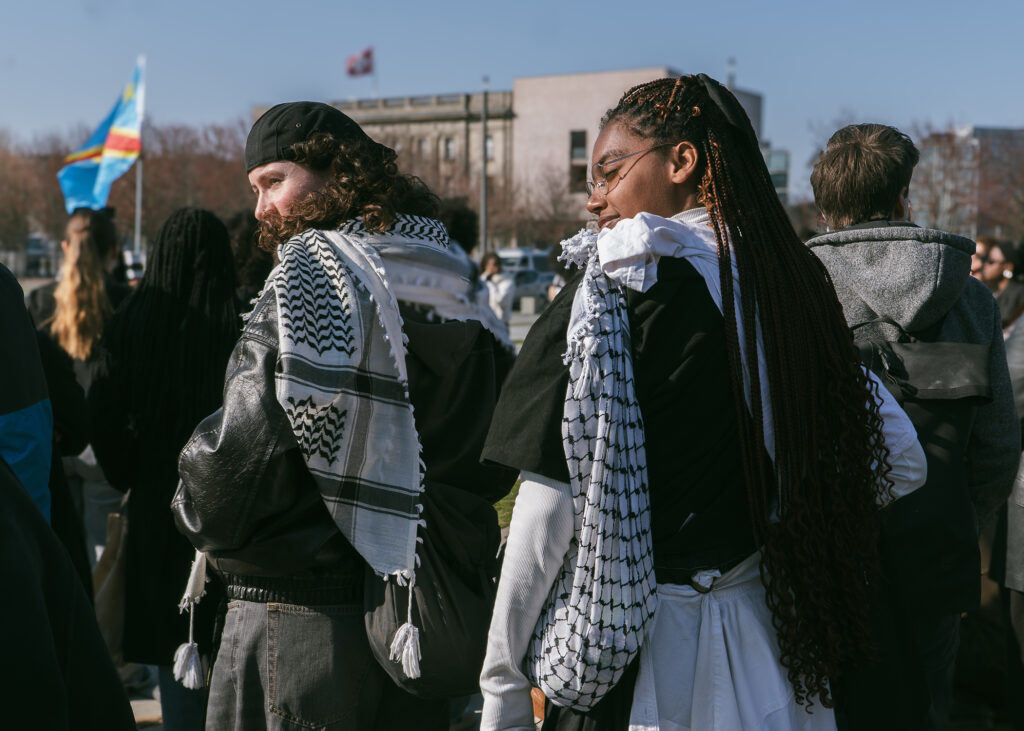
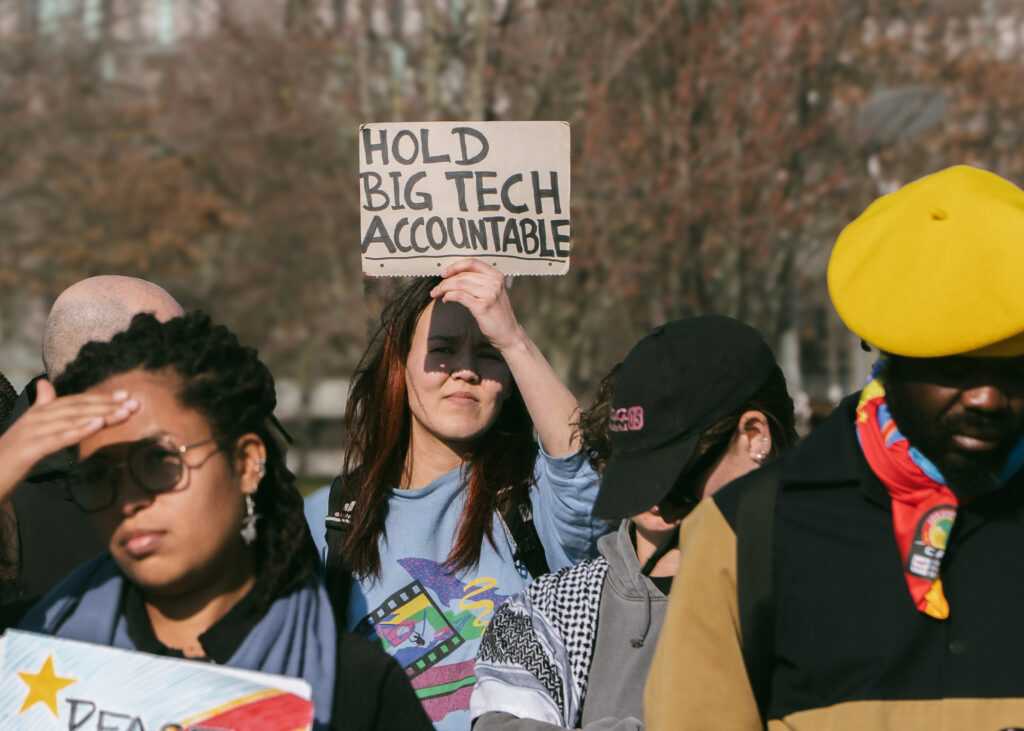
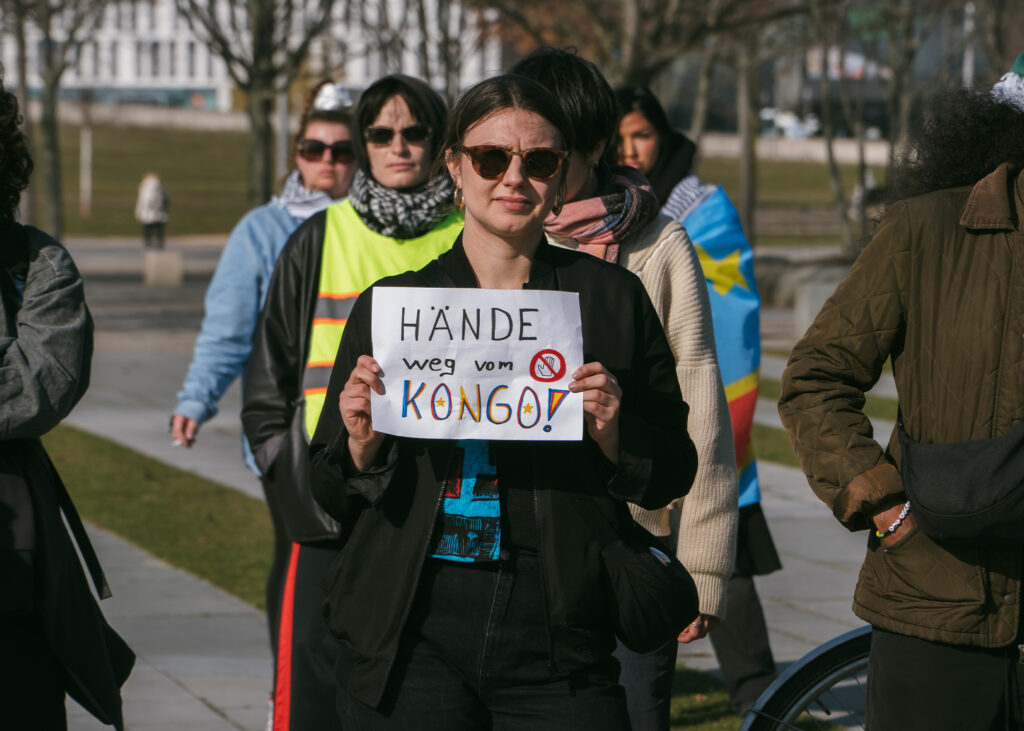
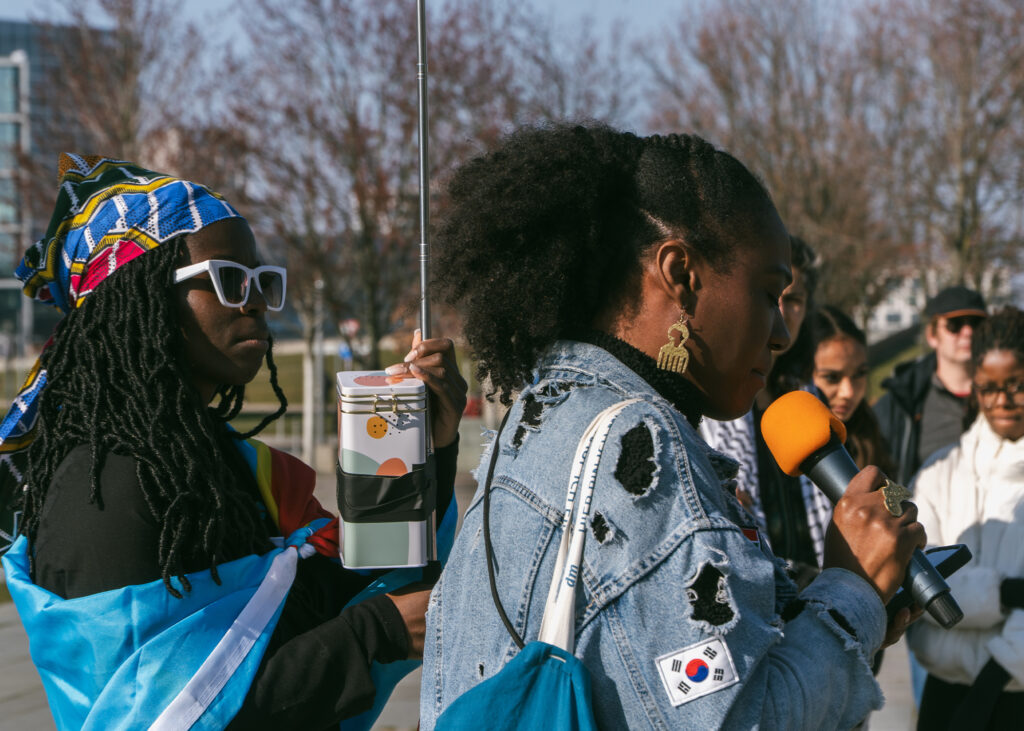
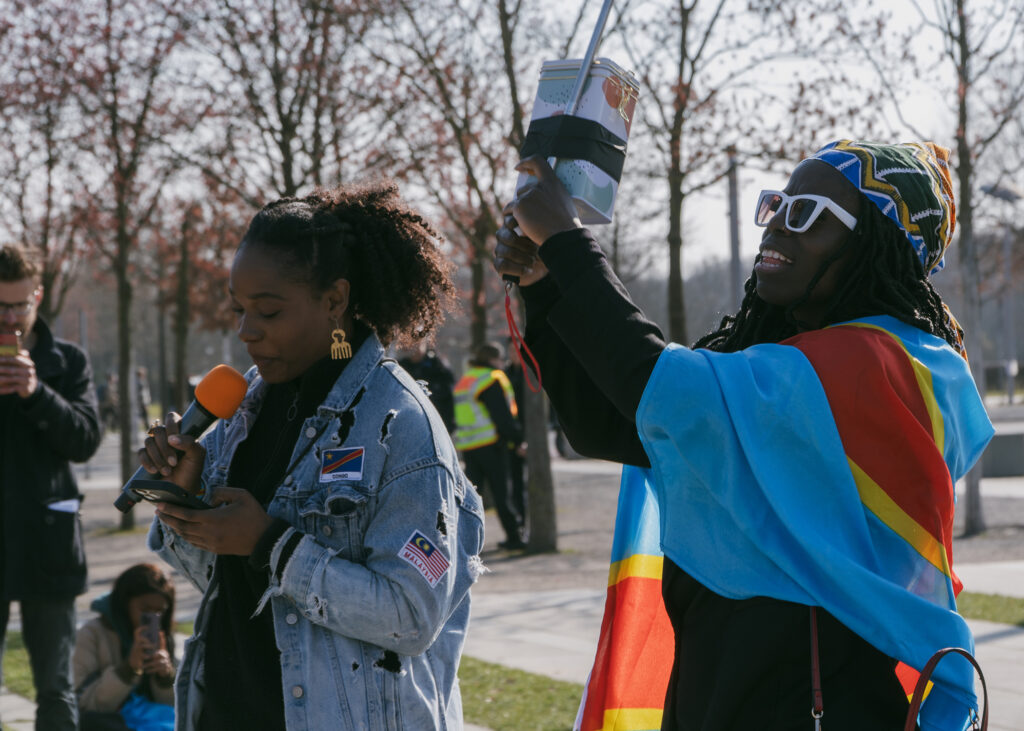
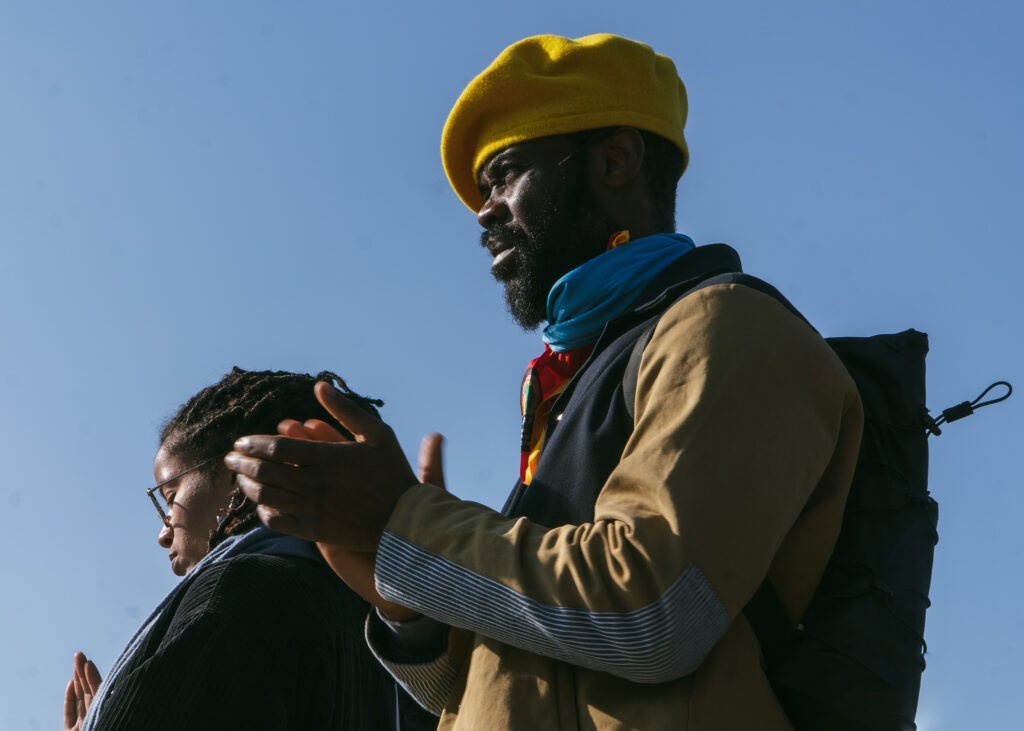
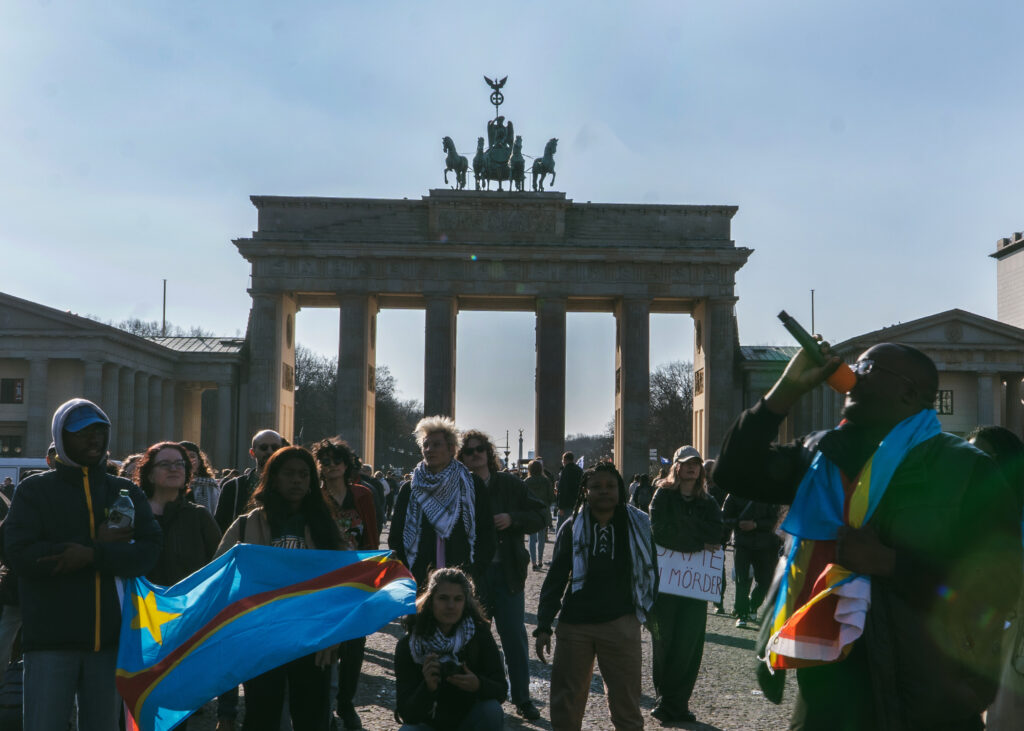
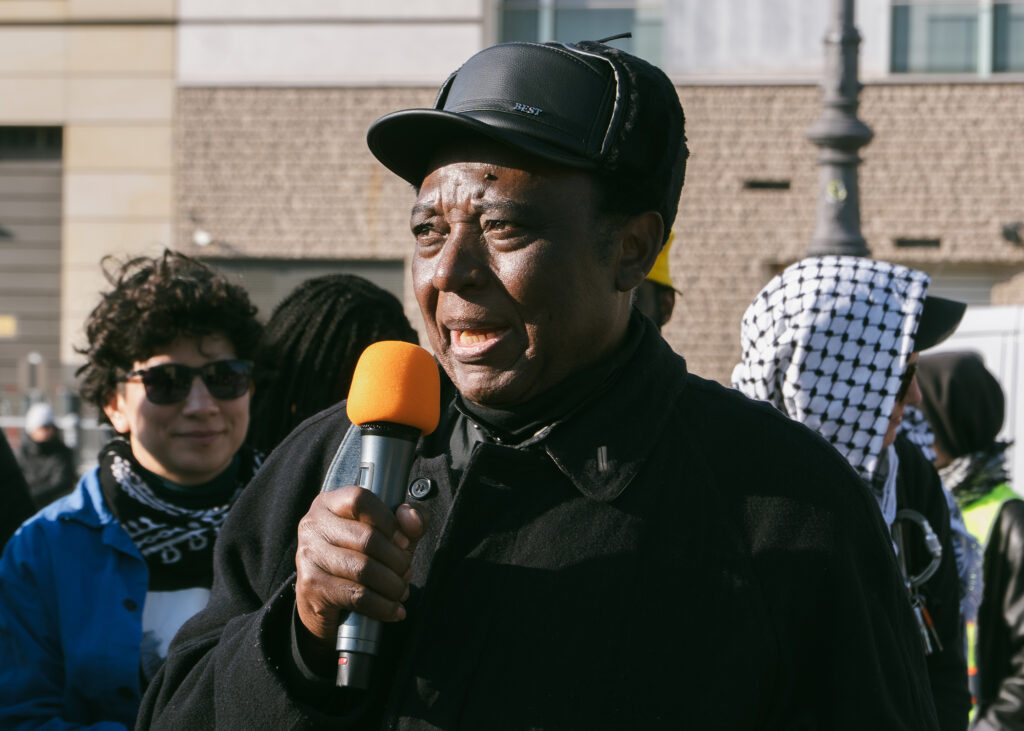
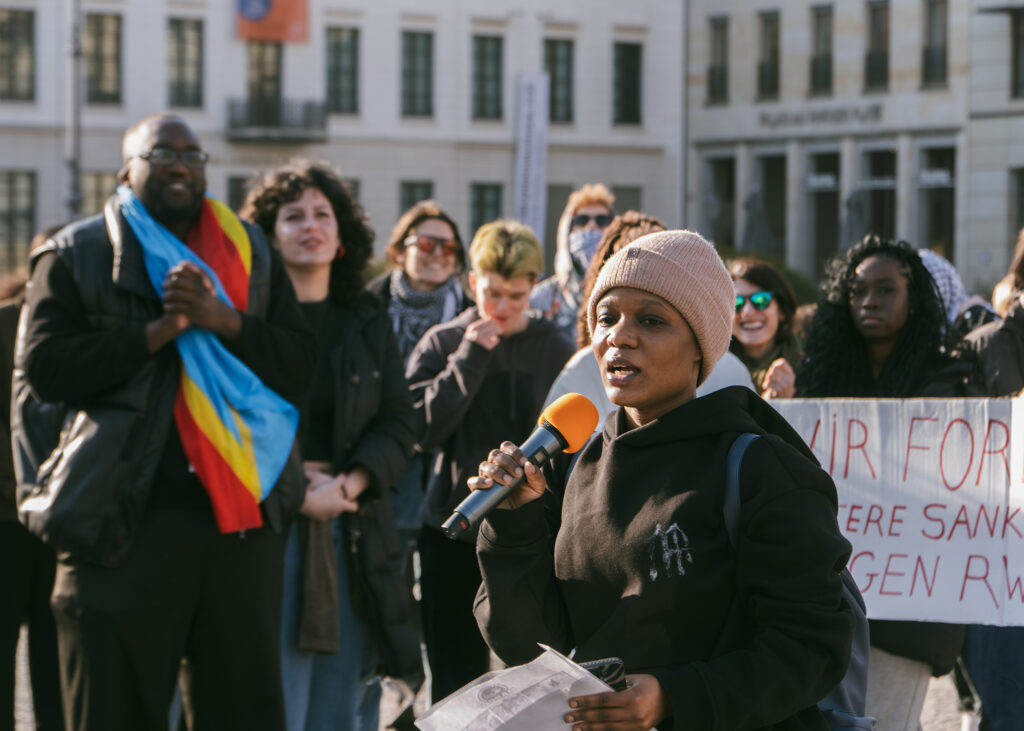
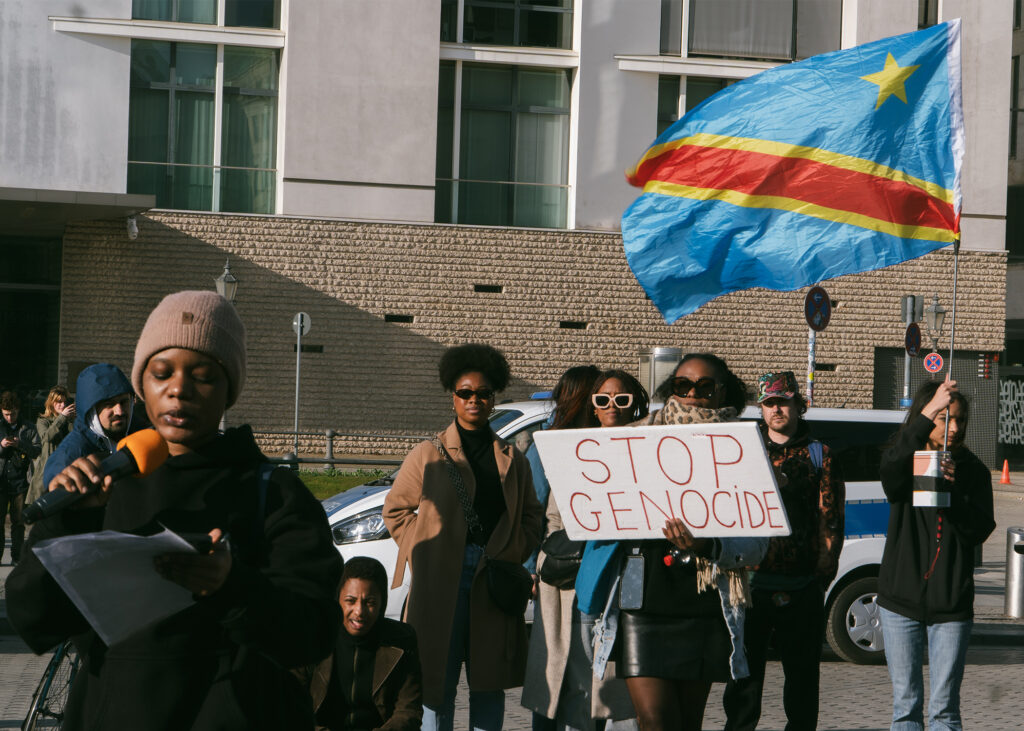
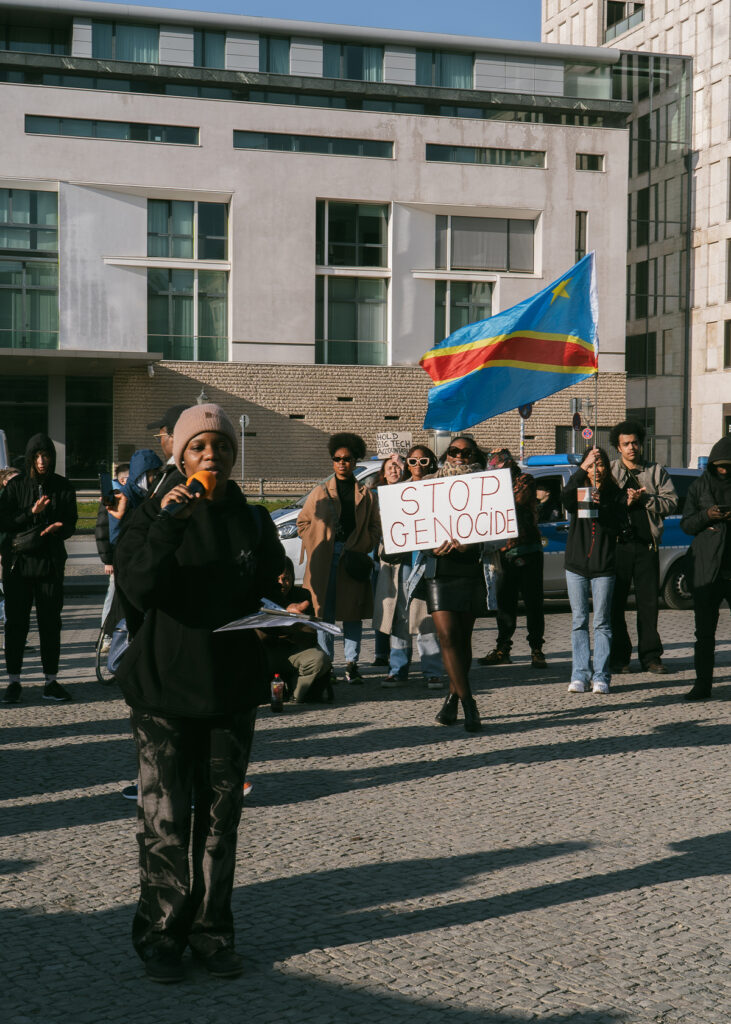
All photos: Cherry Adam
Berlin, Saturday 23rd March 2025, from Friedrichstraße
The Left Berlin
24/03/2025
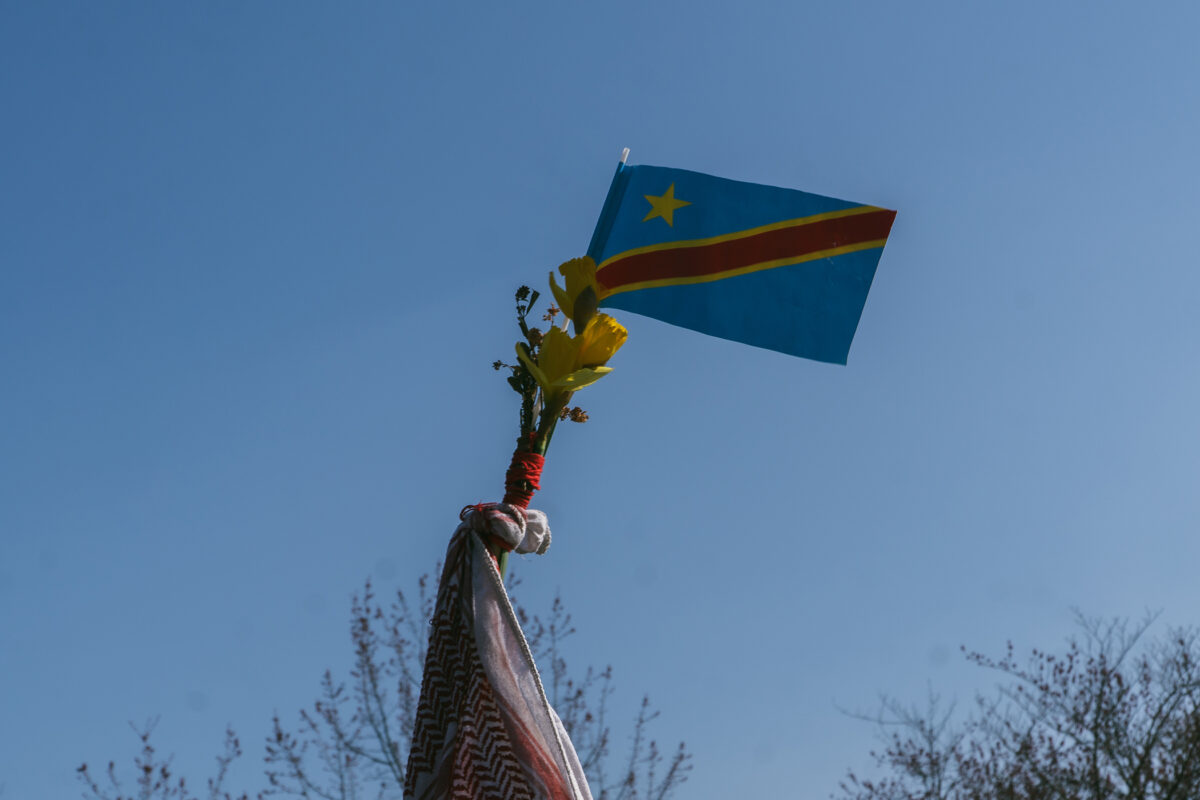


























All photos: Cherry Adam
Ivana Perić Interviews Palestinian Journalist Farah Maraqa
The Left Berlin
21/03/2025
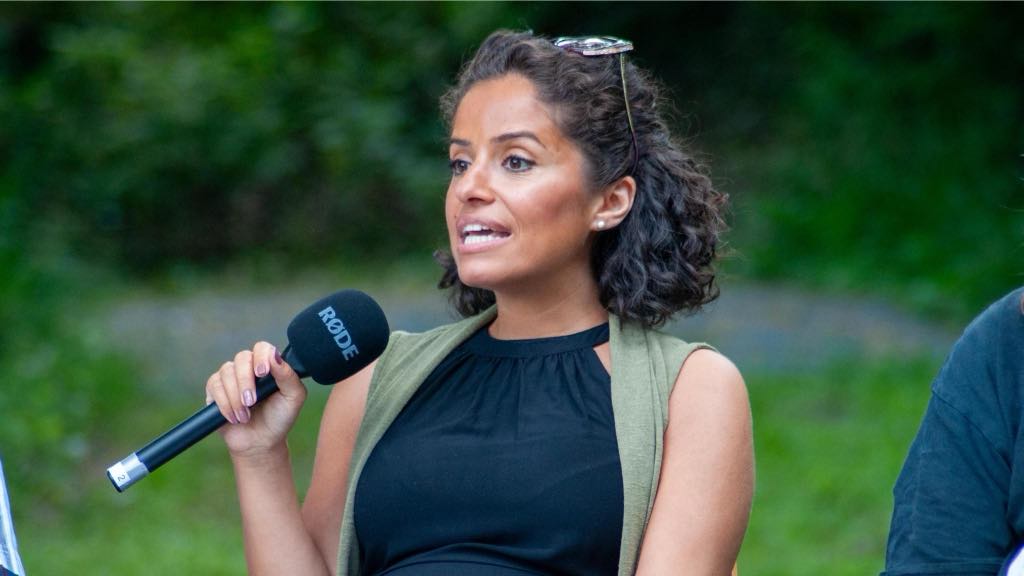
Hello Farah. Could you tell us about your personal journalistic history, including your issues with Deutsche Welle in 2022, the lawsuit and how it was resolved?
I chose journalism because it felt like a powerful tool — not just to have a voice of my own, but to give a platform to those who are silenced. I grew up in Jordan, where the space for female journalists in political reporting is still limited, and I saw journalism as a way to break through those barriers. I worked relentlessly, studying, writing, and pushing forward until I established myself in the field.
But I wanted more than just a seat at the table, I wanted to elevate my professionalism and expand my reach. That’s what led me to Deutsche Welle, a German international broadcaster. After completing a two-month internship, I returned home, only to receive a job offer shortly after — a recognition of my work and the skills I brought to the newsroom. In 2017, I moved to Berlin and began what I thought would be a long-term step in my journalistic career.
Five years later, everything changed. I, along with several other mostly Palestinian Arab journalists, was targeted in a coordinated smear campaign in the German media. Suddenly, our identities were weaponized against us. The accusation? Antisemitism. A label in Germany that, once attached to someone, rarely invites scrutiny or fact-checking. It’s a career-ending allegation. Within two months, the contracts of me and my colleagues were terminated.
But I refused to accept this as my fate. I chose to fight back, not just for myself, but because I understood this was bigger than me, it was about silencing Palestinian voices under the guise of fighting hate speech. Many of us pursued legal action, and while some reached settlements, others such as myself won outright in court. In my case, twice.
This experience solidified something I already knew: being a Palestinian journalist in a Western media institution means constantly defending your right to exist. Not just to speak, but to simply be.
Do other Palestinian journalists face similar obstacles and pressures in their work and life in Germany?
It’s important to emphasize that my experience at Deutsche Welle wasn’t an isolated case. It’s part of a much larger pattern that Palestinian journalists in Germany and across Europe face. From the very first days in a newsroom, we encounter what I call the Palestine exception. You quickly realize that while you can speak freely about almost any political issue in the world, the moment you touch on Palestine, there are unspoken and often very explicit rules.
There’s a rigid set of guidelines about how to discuss Palestine, who you can invite to speak, and which voices are automatically dismissed. As a Palestinian journalist, you enter these spaces carrying a narrative shaped by lived experience only to find yourself confronted with a version of events that has already been decided for you. In Germany, and much of Europe, certain “truths” about Palestine and Israel are taken for granted, truths that directly contradict our reality.
This creates an impossible environment for any journalist who believes in free, critical reporting. Many Palestinian, Arab, and even non-Arab journalists who support free and fair journalism quickly realize that the work they’re doing doesn’t align with the journalism they signed up for. It’s not what they dreamed of. And the moment anyone dares to challenge the status quo, to push back against these biased editorial lines, the consequences are swift.
We see journalists smeared in the press, fired without cause, and labeled antisemitic simply for presenting Palestinian perspectives. The punishments are severe. Some are dragged through exhausting legal battles, others are blacklisted, and many are forced to shift careers entirely. Not because they failed as journalists, but because the system failed them.
And the attack on Palestinian voices doesn’t stop at journalism. It extends to activists, academics, and anyone who dares to speak up for Palestine. This is the harsh reality. Not in an authoritarian state, but in what’s supposed to be “free Europe.”
How did the situation in Germany and German media change after October 2023?
The media landscape and public discourse in Germany has shifted dramatically since October 2023. A recent poll conducted by NDR, a German public broadcaster, revealed a striking divide: 48% of the German population expressed little to no trust in the media’s coverage of Gaza, while only 40% said they had full or significant trust in what they were seeing and hearing. This growing skepticism is a direct result of how the genocide in Gaza has been framed by German media, and it speaks to a broader crisis of credibility.
We’re not just witnessing biased reporting, but the criminalization of Palestinian Solidarity. Protests for Gaza are increasingly portrayed as extremist, and anyone voicing criticism of Israeli actions risks being labeled antisemitic. Journalists, activists, and even academics are finding themselves silenced under this pretext, their words twisted to fit a narrative that protects Israel from accountability.
But this isn’t happening in isolation. It’s deeply tied to Germany’s political stance and its historical guilt. The German state’s unwavering support for Israel often translates into a media environment where Palestinian suffering is minimized or erased entirely. This historical trauma, which should be a reason to stand firmly against all forms of oppression, is being weaponized to justify Israeli violence. The media for the most part mirrors this official line.
Before October 2023 these biases were already present, but there was still space for certain critical voices. Now, that space has all but disappeared. The situation has escalated to the point where not only Palestinian perspectives are shut down, but also the voices of Jewish and any other brave professional journalists who dare to question the status quo.
What we are left with is a media landscape where objectivity is a myth, where “neutrality” means aligning with the powerful, and where those speaking uncomfortable truths about Palestine are treated as threats, not as journalists doing their jobs.
How are European media covering the genocide in Palestine?
Where do we even begin when discussing the genocide in Palestine and how European media has covered it?
The erasure of the Palestinian narrative happens in plain sight. From the constant use of passive voice when describing Israeli crimes, to the open dismissal of UN bodies and the International Court of Justice when they hold Israel accountable. Palestinians are either portrayed as terrorists or reduced to faceless numbers, mere statistics of casualties, with no names, no voices, and no stories.
What we see repeatedly is the media framing this as a “conflict”, as though both sides hold equal power, when in reality this is a settler-colonial occupation with a clear oppressor and an oppressed people. Words like genocide are downplayed or outright criminalized, while Israeli violence is almost always framed as “self-defense.” Palestinians, if they are acknowledged at all, are only visible in death, stripped of their humanity in life.
But this goes beyond media bias, it’s propaganda. It’s a deliberate manipulation of language and framing to manufacture public consent for Israel’s actions. When you consistently depict one side as inherently violent and the other as eternally threatened, you justify the violence of the occupier and delegitimize the resistance of the occupied.
This erasure isn’t accidental, it’s structural. And it doesn’t just shape public opinion; it emboldens state violence and silences those fighting for justice. The media becomes not just a bystander but an active participant in upholding oppression.
In the face of mainstream media’s erasure and distortion, we are witnessing a powerful shift where independent journalists and grassroots platforms are breaking through the manufactured silence.
Palestinian journalists on the ground, especially those in Gaza, have become primary sources of truth. Despite facing unimaginable risks, including the constant threat of death, they continue to document the horrors of the genocide with courage and resilience. Their reporting bypasses the editorial gatekeepers of traditional outlets and speaks directly to the world.
What’s even more remarkable is how citizen journalism and grassroots activism are building global solidarity. We now see independent platforms and journalists reaching wider audiences than many mainstream outlets. They are reclaiming the narrative, refusing to let Palestinian voices be silenced, and holding power to account in ways that conventional media has failed to do.
This shift proves that people are hungry for the truth and that storytelling, when freed from corporate and political agendas, has the power to move people and mobilize action.
What is the role of journalists reporting directly from Gaza?
When we talk about journalism in Gaza, we are talking about an act of resistance, a fight for survival and truth.
Journalists in Gaza are not just reporting the news, they are living the horrors they document. They are not detached observers but survivors, grieving their families, fleeing bombings, and yet holding up their cameras and phones to show the world what is happening.
The sacrifices they are making are unimaginable. More than 190 journalists have been killed since October, the deadliest period for journalists in modern history. Their homes have been targeted, their press vests have become death sentences, and their families have been slaughtered. Yet, they keep reporting because they know that without their voices, the genocide in Gaza would unfold in darkness.
Their persistence shames the silence of many international media outlets. It exposes the double standards of a world that mourns the death of journalists in other conflicts but stays largely silent when Palestinian reporters are killed for doing their job.
What they are doing is more than journalism, it’s an act of defiance against an attempt to erase their people’s existence. They are keeping the memory of the victims alive, fighting not just for press freedom but for the very right of Palestinians to be seen and heard.
We owe them more than solidarity. We owe them amplification. To carry their stories, their footage, and their truths into every space we can.
Mainstream media are nurturing the status quo in European newsrooms and journalism schools, and hiding behind the myth of “neutral” or “objective” journalism. What does that mean in practice and what is the desirable and responsible role of journalism and journalists?
In European newsrooms and journalism schools, we are often taught the importance of “neutrality” and “objectivity”. They are presented as the pillars of good journalism. But what happens when these concepts are weaponized to maintain injustice?
What we’re seeing is how the myth of neutrality is used to mask complicity. Journalists are told to “show both sides,” even when the sides are not equal. They are pressured to echo official Israeli statements without question, while Palestinian voices are treated with suspicion or labeled as biased. This false balance creates the illusion of impartiality while actually reinforcing the narrative of the oppressor.
In practice, “neutrality” often means adopting the language of power. Using words like “conflict” instead of occupation, “clashes” instead of massacres, and criminalizing terms like “genocide” even when they are supported by international law. It means hiding behind so-called objectivity while erasing the reality of systemic violence.
True journalism isn’t about being neutral in the face of oppression, it’s about being responsible. Responsible journalism means providing context, exposing power dynamics, and refusing to equate the colonizer and the colonized. It means standing with the oppressed, not because we are activists, but because journalism’s duty is to pursue truth, and the truth is that there is an ongoing genocide happening in Palestine.
So the question is not whether journalists should take sides, it’s whether they are willing to hold power to account, to break free from the status quo, and to recognize that silence and false balance only serve the oppressor.
How can we be better allies, better journalistic comrades to the Palestinian cause?
Being an ally to Palestinian journalists and to the Palestinian cause goes beyond performative solidarity. It means taking real, often uncomfortable, actions.
First, amplify Palestinian voices. This sounds simple, but it’s a radical act when those voices are systematically silenced or delegitimized. Quote Palestinian journalists, share their work, and push for them to be included in panels, articles, and broadcasts not just as victims, but as experts and storytellers.
Second, challenge your newsroom’s biases. Don’t accept editorial lines that erase Palestinian humanity or sanitize Israeli violence. Ask why certain words are used; why is it always “conflict” and never “occupation”? Why is Israel’s narrative presented as fact, while Palestinians are asked to “prove” their suffering?
Third, build networks of resistance. Allyship doesn’t happen in isolation, it’s about creating strong, cross-border coalitions of journalists who refuse to be silenced. This includes Palestinians, yes, but also Jewish, Israeli and European journalists who are pushing back against their own institutions’ complicity. There is strength in collective action.
Finally, understand that being an ally means risking comfort. It’s not about preserving your reputation or job security, it’s about using your platform, however big or small, to fight for press freedom and truth. Silence may feel safe, but it comes at the cost of Palestinian lives and the integrity of journalism itself.
The question is, are you willing to take that risk? Because that’s what real allyship looks like.
Could you reflect on the broader social and political context beyond the issue of the media and journalism?
This is not just a media issue, it’s part of a broader social and political crisis. What we’re witnessing is the rise of the right wing in Europe, the criminalization of dissent, and the shrinking space for free expression.
The attack on Palestinian narratives doesn’t exist in a vacuum. It’s part of a wider assault on fundamental freedoms. When Palestinian journalists are silenced, when protests for Gaza are banned, when academic discussions are shut down, these are not isolated incidents. They signal a dangerous trend: the erosion of press freedom, freedom of speech, and freedom of assembly.
What’s crucial to understand is that this won’t stop with Palestine. The same machinery used to silence Palestinian voices today can and will be turned against others tomorrow. Staying silent now doesn’t protect anyone, it only allows the architecture of repression to grow stronger.
This is not just about Palestine. It’s about the future of journalism, the battle for truth, and the fight for justice. If we let this slide, we aren’t just failing Palestinians — we are risking our own rights, our own democracies, and the very integrity of the press.
This article first appeared in Croatian in Novosti Hoboctn
Part I: Volksverhetzung
Jason Oberman
19/03/2025
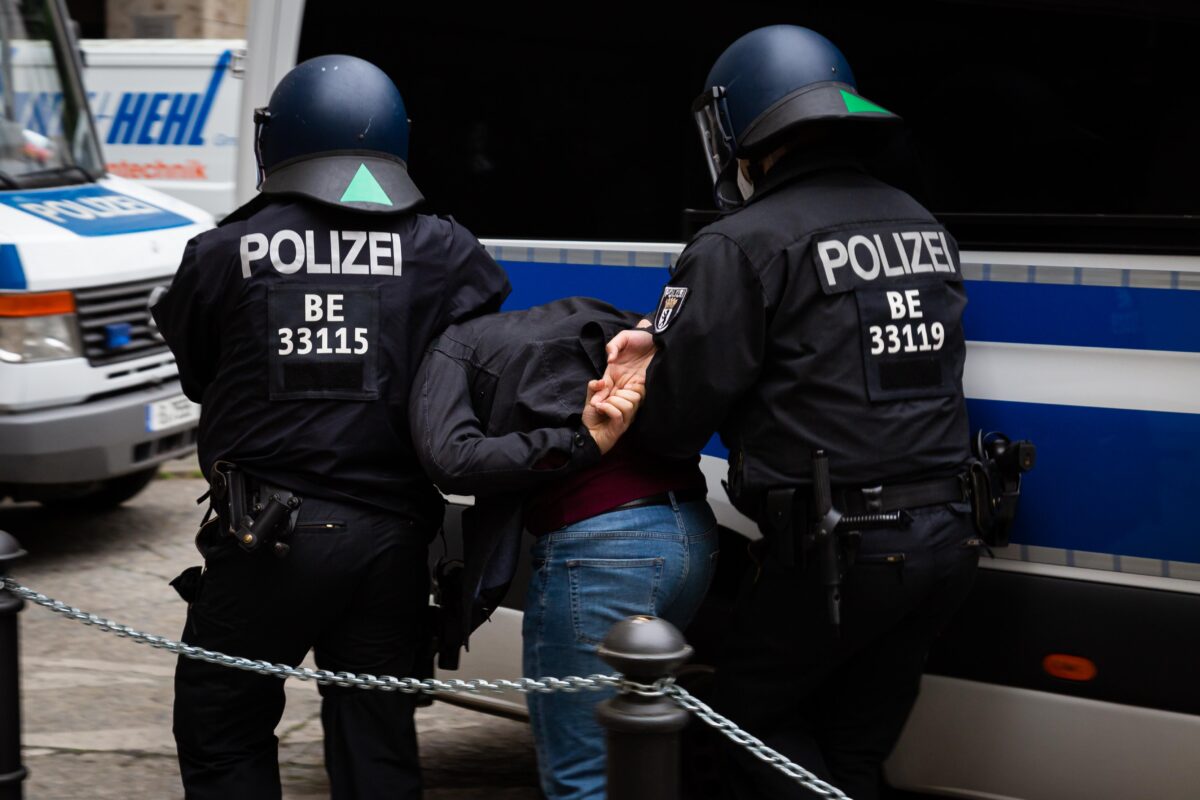
I attended a small public event organized by fellow Jews and allies, where we gathered to publicly grieve, reflect on, and learn about the ways we have been harmed by Zionism. A speech was given, names of Palestinians murdered in the ongoing genocide were read as people lay on the ground holding flowers. Suddenly, the police swarmed in on a person holding a sign that said “from the river we do see nothing like equality”. The police wanted to detain them to “check over” the sign. They refused, stating that it did not violate any laws, including the Berlin government’s ban on the statement “from the river to the sea“. Nonetheless, a number of armed officers grabbed them and violently arrested them as they stood peacefully with a sign advocating for justice.
They were charged with Volksverhetzung – one of the main German hate speech laws which criminalizes inciting hatred, and as there is no formal antisemitism law yet, this often implies inciting so called antisemitic hatred. Although this charge was later dropped in the post a few weeks later, the damage was irreversible. During the police attack on the peaceful sign holder, people stood up to verbally defend the protester, but one person made the mistake of calling a police officer an asshole. This man was violently arrested and charged with Beleidigung – a law that criminalizes insulting individuals or groups, punishable with jail time even. Yes, you read that correctly, insulting someone is a criminal offense in modern Germany. Shortly after, a young Palestinian person was also arrested and charged with Beleidigung for apparently insulting an officer in Arabic. He denies this charge completely.
Since October of 2023, I noticed these two laws seem to offer frequent justification for many other arbitrary and excessively violent arrests of activists in Germany standing against genocide and oppression in Palestine. In March 2024, an activist was charged with Volksverhetzung for wearing a jacket that said “from the river to the sea”. Under Volksverhetzung, he also had a t-shirt confiscated (it was returned after 5 months with dropped charges). Beleidigung was also the pretext used against Udi Raz as grounds to justify a recent arrest; police laughed at her kippah, so she pointed out that this was antisemitic. This was considered an insult to German Polizei, thus a potential criminal offense. These are just a few of the more publicized cases, but these are by no means the exception.
Although certain German judges have thrown out some of these charges, the brutality and oppression facing those who are in solidarity with Palestine is only getting more severe. For at least the second time in the span of a year, German police forbade all languages other than English and German at a public demonstration on the grounds that they need to check speech for Volksverhetzung (the first case I know of happened here in April, 2024 where people were forbidden to pray in Arabic during Ramadan at a legal protest camp for the same reason). As if this was only testing the waters, the German state is currently ramping up to possibly alter Volksverhetzung law to expand police power and criminalize speech further. While it wasn’t so surprising that the Beleidigung law could be used for such repressive purposes, it was only through a thorough excavation of the histories of both of these laws that I began to understand how German forces could hijack Volksverhetzung, a law seemingly created to fight discrimination and protect human rights, to become a key tool in state violence against vulnerable populations. Through this understanding, it became clear that German police employ both of these laws with their original intentions: persecution, oppression, and maintenance of domination hierarchies. Let’s take a wild ride down into the wacky worlds of German hate speech and insult law.
The modern German Volksverhetzung law, known as Article §130, is rooted in Prussia’s 1794 law code, the Allgemeines Landrecht, which banned expressions of incitement against the kingdom and against certain religious groups, along with speech that dishonored individuals, thereby also serving as the root of Beleidigung legislation (Goldberg 483). It was then written into Prussian law in 1851 as Article 100 after the 1848-49 uprisings to suppress radical leftists and maintain the power of the monarchy. The law penalized “‘whoever endangered the public peace by inciting [anreizen] hatred or contempt of members of the state against each other’ … with either a fine of twenty to two hundred Thaler or a sentence of one month to two years in prison” (Goldberg 483). The article ended up being used for “arbitrary, unjust, politically motivated prosecutions and the widespread muzzling of critical debate on public matters”(Goldberg 487). Echoing modern times, Prussian Interior Minister Otto Theodor von Manteuffel stated that this law embodied a battle between “defenders of law and order and the protectors of civilization versus terrorism.” Article 100 was reformed into Article 130 in 1871 to apparently focus the law on punishing actual violence rather than arbitrary Feindlichkeit, or hostility (Goldberg 487). Despite the so-called reform, it seemed as though matters only got worse: “Article 130 was used to repress class, ethnic, national, and political differences. Indeed, that law became so identified with government campaigns against organized labor and Social Democrats that it came to be known as the Klassenkampfparagraph” (Goldberg 481) This is the same Article 130 which governs Volksverhetzung today, albeit with some updated wording. It should be noted that shortly after creating Article 130, the government expanded the law to persecute Catholics (Goldberg 487). Amendment 130a was created to silence Catholic critics of the Protestant state during the Kulturkampf (Recall that Hitler also had some problems with the Catholics).
Unfortunately, Volksverhetzung only became more repressive as time went on. As Germany tried to “Germanize” the Poles in East Prussia, German police, prosecutors and judges used these hate speech laws to suppress Polish nationalism (Goldberg 489). Scholar Ann Goldberg recalls an outcry in 1906 by the Polish community because “popular songs, poems, picture postcards, and other visual images ranging across Polish life” had been banned and criminalized under Volksverhetzung (Goldberg 490). This is hauntingly similar to the use of Volksverhetzung today if you replace the word Polish with Palestinian. Palestinian slogans, images, posters, protests, speeches, flags, t-shirts, instagram posts and even the traditional keffiyeh have been criminalized.
Amir Ali, a Palestinian who who resides in Munich, told Al Jazeera in October of 2023:
“I was even forbidden to walk inside the city for 24 hours because I was wearing a keffiyeh. There’s a crackdown on all pro-Palestinian voices across Germany, and in my opinion, they don’t want anybody to speak up about the crimes against humanity being committed by the Israeli state.”
Scholar Ann Goldberg continues on Polish persecution under Volksverhetzung: “What rankled was not only the repression but also the biases of the authorities and the blatant partiality with which justice was meted out, sparing German racist hate speech against Poles, even when it outrightly called for violence” (Goldberg 490). This has a haunting resonance today. Take for example, cases of “from the river to the sea”; as previously established, Palestinians and those in solidarity are attacked and arrested by the police and charged with Volksverhetzung when they even hint at the phrase in regards to liberation of Palestine, but when the line is used favor of Israeli genocide and illegal annexation of Palestine, they are protected (watch this video here). And we must of course remember that the German state itself calls for, justifies, and funds the ongoing genocide in Gaza while using Article 130 to silence those who speak out.
Although Volksverhetzung law was originally designed to repress minority groups and leftists, in the 1890s, a grassroots Jewish advocacy and defense organization, the Centralverein deutscher Staatsbürger jüdischen Glaubens, attempted to repurpose the law to help protect Jews from anti-Jewish hate speech (Goldberg 483). Their attempts had some scraps of legal success, but ultimately failed, in part due to widespread anti-Jewish racism within the courts (Goldberg 494). Even at the time, some Jews were skeptical of repurposing the law to fight anti-Jewish racism, and others were openly against it (Rohrßen 149). The German left generally agreed with the latter group, and sought to abolish these laws as they saw them as a threat to basic democratic principles (Goldberg 494).
With the installation of the Third Reich, there was no hope of repurposing the law to fight for protection of vulnerable groups. Furthermore, the Nazis understood the original purpose of the law and attempted to make it even more repressive. While they never officially ratified a new version of the law, a suggested version put forth in 1933 was highly influential in how the law was to be interpreted and later re-written (Rohrßen 125). This suggestion gives us an invaluable glimpse into the fascist reinterpretation of Volksverhetzung, which still has echoes today. A Nazi jurist suggested updating the wording to focus on protecting the “peace of the people” from public discussion, printed matter or other writings which included “inflammatory” words on state affairs (Rohrßen 126). It should be understood that to Nazi Germany, and perhaps the modern German state, “people” are defined as Aryan Germans (just as, for example, America defined “all men created equal” as wealthy landowning white christian males). And we know that Hitler sent legal scholars to the US to study American apartheid and Jim Crow laws (Teter 216-217). Echoing article 130a (recall it had been used to persecute Catholics), it would be considered “especially serious” if civil servants and religious officials committed these crimes. For all “especially serious” violations of this law, deprivation of citizenship would be one possible consequence (Rohrßen 127).
This ideology is still prevalent today, although now under the guise of the war against antisemitism. Felix Klein, Federal anti-antisemitism Commissioner, while making a sweeping condemnation of many Muslims, was in favor of denial of citizenship for those who inflamed the German state through critique on Israeli war crimes and genocide. The state of Saxony-Anhalt was the first German state to require a commitment to “Israel’s right to exist” as a prerequisite for citizenship, and indeed the whole country followed suit in June 2024, requiring all applicants for citizenship to commit whole-heartedly to Israel. Invoking its namesake of upholding a [white] Christian Democracy, the CDU proposed to cut “humanitarian protection” for non-German nationals (ie deportation) and a revoking of citizenship for German dual citizens if they receive a prison sentence of one year for “crimes with anti-semitic motives.” As previously established, these “antisemitic” crimes are often prosecuted under Volksverhetzung and most often applied to racialized, peaceful protestors, Jews included (refer to my article for more cases). What’s more, the German Left: Social Democrats, the Greens and Free Democrats – also hope that “antisemitic attitudes or actions” will rule out naturalization. As antisemitism has been redefined to mean Palestinian people, Muslims, leftist Jews and critics of state violence and genocide, one must wonder how far we have come from Germany’s darkest years. As we keep exploring the history of this law, we must realize with heavy hearts, we have not come very far at all.
The Volksverhetzung law did not change much in the postwar years. Actually, in some ways, it remained exactly the same: “Although Section 130 of the German Criminal Code was subject to significant fluctuations in its interpretation, its wording had remained unchanged since the creation of the Reich Criminal Code and the provision was therefore not affected by the denazification efforts”. (Rohrßen 151) Once again, some considered abolishing the law. However, after the Holocaust, “anti-antisemitism and the Jewish cause became synonymous with democracy” (Goldberg 495) and West Germany was having trouble with its image as a post-Nazi democratic state. There were hundreds of widely reported anti-Jewish incidents, including vandalizations of cemeteries, carried out in West Germany between the end of 1959 until February 1960. West Germany needed a quick way to deal with its damaged image as a violent, racist state that failed to denazify. One quick fix was to sweep German dirt under the blue and white flag: to symbolically make amends to the Jewish people through funding the Israeli military. And another method was to attempt, at least on the surface, to protect human rights through repurposing Volksverhetzung.
Given the precedent of Jewish activists attempting to use Article 130 to fight anti-Jewish racism, Germany nobly decided to repurpose the law to ‘protect’ Jews and other non-white and/or non-Christian populations; in 1960, Germany finally updated the 3rd Reich wording of the Volksverhetzung law. The Jewish community, however, had an important warning, which had been vocalized since the 1890s (Rohrßen 149). Jewish Germans advocated that the law be used to protect all vulnerable groups, not solely Jews. The fear was that isolating Jews as a separate and privileged group would “play into the hands of antisemites” (Goldberg 497). Jewish German leadership recommended the wording “parts of the population (Teile der Bevölkerung)” rather than specifying certain races or nationalities. Although the language remains non-specific, politicians have been racing to change that: alarmingly, new CDU Chancellor Friedrich Merz recently advertised that he will greatly expand police power and control through changing Volksverhetzung law to focus on “anti-semitic perpetrators” by further criminalizing anyone who questions Israel’s “right to exist.” Furthermore, aforementioned Felix Klein, Federal Anti-Antisemitism Commissioner, has also been fighting since at least August 2023 to change the language to be specific. Germany has also singled out the Jews as a “separate and privileged group” by creating the vast array of Antisemitism Commissioners who often employ this law. Recall that no other religious or racialized group has a single commissioner for their “protection,” and only a microscopic 0.33% of the German population is Jewish. The fact that Jews can also be persecuted for “antisemitism” through this Article 130 reveals Germany’s true intentions.
As we further investigate the language used to rewrite the law in 1960 and the way this language was interpreted we might be included to crinkle our noses at the ranking fishiness, a fragrance specific to German law. The new version of Article 130 added language on penalizing attacks on “human dignity, or Menschenwürde (Goldberg 495). Although Germany had developed refined definitions of human dignity in relation to modern notions of human rights, jurists chose to define dignity in terms of military doctrine and the old Prussian honor codes it referred to: “The result was some noticeable, and sometimes distressing, limitations on the reach of German hate-speech legislation. As a leading critic of the jurisprudence of § 130 would complain twenty-five years later, the habit of looking to military law, and more generally to old-style ideas of personal honor, rather than to the great ideals of the constitution, survived” (Whitman 1341). We will shortly return to a deep investigation of German honor, but suffice it to say that this old notion of militaristic honor had nothing to do with human rights but rather with maintaining social, racial, and class hierarchies through deadly violence, and was even a fundamental ideology of the Nazi regime.
Although Article 130 eventually lost the wording on human dignity, “Hate-speech regulation was accordingly not construed to require a general climate that guaranteed minorities an equal sense of dignity; it was understood as something like a more “humane” and philosophical law of insult. This left little room for a law of hate speech that would address itself to the deeper structure of social relations-indeed, no room even for a law of hate speech that would require tavern-keepers to take down signs excluding Turks” (Whitman 1342). There was indeed a 1985 case where “no entry” signs against Turkish people were allowed under Volksverhetzung law. Apparently, if we want to further understand Volksverhetzung, we must explore the laws and philosophies which it orbits around: German insult law and German Honor.
© Jason Oberman, all rights reserved, 2025
Works Cited:
We will be publishing parts 2 and 3 of this article on theleftberlin.com soon
The Water Integrity Network (WIN) is the leading global research and advocacy partnership dedicated to clean water governance.
WIN focuses on corruption risk prevention and awareness raising, knowledge sharing and technical assistance for integrity since 2006.
We champion integrity to improve water and sanitation management and service delivery for all, including the poorest and most marginalised.
By addressing corruption in water and sanitation, together we can transform water and sanitation management and service delivery to reach everyone, including the most marginalised.
We work as a global research and advocacy partnership, focusing on:
Join and support us to ensure transparency, accountability, participation, and anti-corruption shake up the water and sanitation sectors for good.
In Tuesday, March 5th, the Water Integrity Network and Uhuru Productions, with support from Brot für die Welt and the Rosa Luxemburg Stiftung, invite you to this free film showing on Day Zero in Cape Town: Capturing Water.
Capturing Water brings fresh insights into water activism and hope from Cape Town, South Africa, and a lesson for water activists everywhere facing major climate-related ravages in their cities.
The film shows the human realities of water scarcity and the decisions and empty promises that lead to day zero scenarios.
Capturing Water introduces different activists as they work tirelessly for their communities’ rights to water and life: a working class activists mobilising against water cut-offs without the dignity of discussion, an activist farmer litigating to stop city plans to cement over an aquifer that provides affordable food to thousands of people, and a suburban activist tirelessly engaging the city to stop sewage flowing into life-giving wetlands.
Afterwards WIN will moderate a discussion on water justice, city politics in times of climate change, and the dynamics behind “day zero” announcements. Seating is limited, please RSVP here to attend.
Tuesday, March 25, at 5:00 pm.
Kino der Kulturbrauerei, Schönhauser Allee 36, 10435 Berlin
We hope to see you there!
Weekly news round-up from Berlin and Germany

NEWS FROM BERLIN
Next warning strike at BVG
The Berliner Verkehrsbetriebe (BVG) will once again be on strike. The trade union ver.di announced on Friday that it calls on employees to go on a two-day warning strike on March 19 and 20. The strike will take place before the next round of negotiations, on March 21. The ver.di negotiator Jeremy Arndt said that the BVG’s latest offer was “completely inadequate.” It ignores the massive price increases that employees have to contend with on a daily basis. If no agreement is reached by next Friday, Arndt mentioned the prospect of a ballot for indefinite strike action. Source: rbb
Mohamed Amjahid: “The police have ‘carte blanche’ to beat up in Berlin”
Several videos from the Berlin demonstrations on Women’s Day instances of police violence, such as a woman on the ground with an officer pressing her head down into his genitals. Journalist Mohamed Amjahid has been researching themes such as sexualized police violence in Berlin for more than 10 years. Amjahid’s research shows that it makes a difference which demonstrations one participates in, and that the police tend to protect right-wing demonstrators. “Women and queer people are particularly affected”, he added. The researcher believes that the police have “carte blanche” to violently crack down on protesters. Source: berlinerzeitung
NEWS FROM GERMANY
Tesla sales fall, anger at Elon Musk grows
Sales figures show that it is increasingly difficult for Tesla to find buyers in Germany. Musk’s controversial policies seem to make it hard for potential customers to decide in favour of a Tesla e-car. The manufacturer points to a planned pause in the production of the model “Y.” As André Thierig, plant manager at Tesla Grünheide, points out: “We completely overhauled the Model Y at the beginning of this year”. However, the American manufacturer’s sales are collapsing not only in Germany, but also in China and in the rest of the European Union. Experts say that the Tesla crisis is home-made, by the boss himself. Source: rbb
Right-wing groups attack refugee accommodation
An investigation is underway against three individuals suspected of attacking a refugee center in Stahnsdorf, south of Berlin, according to the spokesman for the Potsdam public prosecutor’s office, Christian-Alexander Neuling. The public prosecutor’s office has so far not offered details about the events and the victims, citing the ongoing investigation. The Brandenburg’s Interior Minister Katrin Lange (SPD) declared that “such attacks on refugee accommodation are completely unacceptable and must firmly be condemned. People seeking protection must be able to live safely in Brandenburg without violence and threats.” Source: islamiq
Billions approved, credibility damaged
After more than three hours of debate, the CDU/CSU, the SPD and the Greens reached a majority in a special session of the Bundestag, amending the Basic Law at the last minute in order to take on billions in additional debt. The funds will go to infrastructure, defense, and investments by the federal states. The path to a majority was painful for future Chancellor Friedrich Merz (CDU), who had run his electoral campaign against such billion-euro programmes and had to listen to accusations of insincerity from AfD and FDP members during the special session. Now all eyes are on the Bundesrat, where representatives of the federal states have to approve the Budestag’s decision. Source: tagesschau
Guns, butter, war credits
The German debt brake is being reformed to allow boundless loans for armaments in the future. Exactly how much money is needed for armaments is uncertain. The governments of the USA, China and the UK are also planning loans totalling thousands of billions for the large-scale purchase of weapons and equipment. The states’ lenders are the financial markets. Their judgement determines how much armament a state can afford and how much it will cost, with obviously serious consequences for the population. Source: nd
Bavaria wants to vote in favour of financial package in the Bundesrat
The Bavarian state government does not have the intention of blocking the federal government’s financial package in the Bundesrat, according to State Chancellery Leader Florian Herrmann (CSU) after a crisis meeting of the coalition partners CSU and Free Voters (Freie Wähler) in Munich. However, the state will set out its position in a protocol declaration, making clear that climate neutrality should not be defined as a state objective and that the financial equalisation between the federal states must be reformed. Source: tagesschau
AfD MP employed in Thuringian BSW ministry
Lydia Funke has vilified political opponents as “journeymen without a fatherland” and affirmed that criminal “foreigners” would be “thrown out.” The AfD politician has been attracting attention with slogans of this kind for almost ten years, including five years as a member of the state parliament in Saxony-Anhalt. Now the 42-year-old has a new job: as a consultant in the Thuringian Ministry of the Environment, which is run by BSW member Tilo Kummer. The matter is explosive because the AfD has long been classified as a confirmed right-wing extremist organization by the Office for the Protection of the Constitution in both Thuringia and Saxony-Anhalt. Source: taz
Employers’ side sees compromise in wage public sector dispute
Unions and employers seem to come closer together in talks about the wage dispute for federal and municipal public sector employees. “The gap has narrowed considerably,” said Karin Welge, chief negotiator for the Federation of Municipal Employers’ Associations, in Potsdam. However, there is no end in sight to the third round of wage negotiations, which began last Friday, and yet no official assessment from the trade unions. It is also conceivable that one side could declare that the negotiations have failed. Then there would be arbitration – and no further warning strikes for the time being. Source: rbb